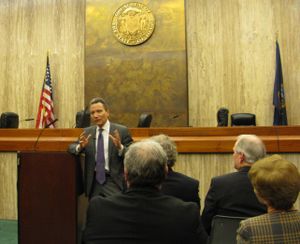Darrington Lecture looks into interplay between tech and constitutional rights
Jeffrey Rosen, president and CEO of the National Constitution Center and a law professor at George Washington University, told an audience of state and federal judges, lawyers, lawmakers, students and more at today’s Darrington Lecture on Law and Government that what his center in Philadelphia does matches up with what Idaho’s exploring for its new Idaho Law and Justice Learning Center in Boise. The Idaho center is being envisioned as a center for legal and civic education, including the state law library and the UI’s Boise law school programs, along with educational programs for everyone from judges to high school and college students; it would be in the former Capitol Annex across from the state Capitol, under the auspices of the Idaho Supreme Court, the University of Idaho College of Law and the Idaho State Bar.
Rosen said his center was created during the bicentennial, with a charge from Congress “to disseminate information about the Constitution on a nonpartisan basis.” Its board chairs have included George H.W. Bush, Bill Clinton, and Jeb Bush. Its activities include operating a museum that overlooks Independence Hall in Philadelphia, “where the Constitution was debated and where the Declaration of Independence was signed.” Rosen said the center also serves as “America’s town hall, the one place where people … can come to debate not political issues but constitutional issues.” He said, “We are trying to take this vision of bipartisan constitutional debate and bring it to every city in America.”
His lecture today is entitled, “The Constitution in the 21st Century,” and Rosen is discussing how Google and Facebook, cell phones that track location, and even drones that can conduct surveillance on Americans, fit in with 4th Amendment protections against unreasonable searches and seizures. “This is not a dry and technical legal debate,” Rosen said. “We need to come up with a way of translating the Constitution so that it protects just as much freedom of thought in the 21st Century as the framers took for granted in the 18th.”
Among those attending today is the winning team from Blackfoot High School that won Idaho’s “We the People” state finals, at which the students are judged for their debates of historical and constitutional issues. “They’ve done a fine job,” said Idaho Supreme Court Chief Justice Roger Burdick. “I think it’s a great program, it’s a great start on civics education.” Rosen has been posing constitutional questions to the high school students, who are giving learned, animated and detailed answers.

